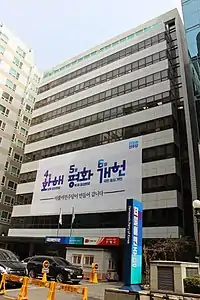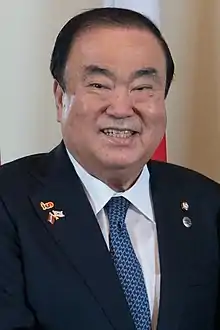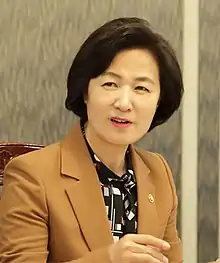Democratic Party of Korea
The Democratic Party[12] (Korean: 더불어민주당; Hanja: 더불어民主黨; RR: Deobureominjudang; lit. Together Democratic Party; short form 민주, 더민주 Minju, Deominju, known as "Minjudang" 민주당 in South Korean media since 2016),[13] formerly the New Politics Alliance for Democracy (NPAD),[14] is a centrist,[8] liberal[2] political party in South Korea.
Democratic Party 더불어민주당 | |
|---|---|
 | |
| President of South Korea | Moon Jae-in |
| Leader | Lee Nak-yeon |
| Floor leader | Kim Tae-nyeon |
| Secretary-General | Park Kwang-on |
| Chair of the Policy Planning Committee | Hong Ihk-pyo |
| Founded | 26 March 2014 (as New Politics Alliance for Democracy) 27 December 2015 (as Democratic Party) |
| Merger of | Minjoo Party Platform Party |
| Preceded by | Democratic Party (2011) New Politics Alliance |
| Headquarters | 7, Gukhoe-daero 68-gil, Yeongdeungpo District, Seoul |
| Think tank | The Institute for Democracy |
| Youth wing | Democratic Party of Youth |
| Membership (2019) | 4,065,408[1] |
| Ideology | Liberalism[2]
Social liberalism[3][4] Factions: Social conservatism[5][6][7] |
| Political position | Centre[8] to centre-left[9] |
| Colours | Blue (Democratic)[10] Blue (NPAD)[N 1][11] |
| Seats in the National Assembly | 175 / 300 |
| Metropolitan mayors and Governors | 13 / 17 |
| Municipal Mayors | 151 / 226 |
| Seats within local government | 2,290 / 3,750 |
| Website | |
| theminjoo | |
| Democratic Party of Korea | |
| Hangul | 더불어민주당 |
|---|---|
| Hanja | 더불어民主黨[N 2] |
| Revised Romanization | Deobureominjudang |
| McCune–Reischauer | Tŏburŏminjudang |
| New Politics Alliance for Democracy | |
| Hangul | 새정치민주연합 |
| Hanja | |
| Revised Romanization | Saejeongchi Minju Yeonhap |
| McCune–Reischauer | Saechŏngch'i Minju Yŏnhap |

The party was founded on 26 March 2014 as a merger of the Democratic Party and the preparatory committee of the New Political Vision Party (NPVP). The former Democratic Party was legally absorbed into the NPAD after the latter's creation, while the preparatory committee of the NPVP was dissolved, with members who supported the merger joining the NPAD individually. The Democratic Party is one of two major political parties in South Korea along with its rival, the conservative People Power Party.
History
Formation and Ahn–Kim leadership (March–July 2014)

The Democratic Party was formed as the New Politics Alliance for Democracy (새정치민주연합; Saejeongchi Minju Yeonhap) on 26 March 2014 after the independent faction led by Ahn Cheol-soo, then in the process of forming a party called the New Political Vision Party, merged with the main opposition Democratic Party, led by Kim Han-gil. Ahn and Kim became joint leaders of the new party.[15] The party performed poorly in by-elections that July, however, and both leaders stepped down, having served for three months. Leadership of the party was assumed by an emergency committee.[16]
Ahn–Moon controversy and split (2015–16)
The next year, at a party convention on 7 February, Moon Jae-in was elected the new chairman of the party.[17] Moon, who had previously served as chief of staff for former president Roh Moo-hyun,[17] was the leader of the party's "pro-Roh" faction, which was opposed to Ahn and Kim. Moon came under fire for imposing a "pro-Roh hegemony" in the party, as Ahn and Kim were jeered and harassed at a memorial service for Roh held in May 2015.[18]
The party hemorrhaged support as the factional conflict intensified, falling from around 40 to 30 percent in opinion polls.[19] A survey conducted on 12–14 November showed that supporters of the party wanted Ahn and Seoul mayor Park Won-soon to assume the leadership alongside Moon.[20] On 29 November, Ahn rejected a proposal from Moon to establish a joint leadership,[21] and the next month he presented Moon with an ultimatum, demanding that he would call a convention to elect a new party leader. Moon rejected the demand,[22] and Ahn left the party.[23]
Ahn was followed by a number of supportive NPAD assembly members, including his former co-leader Kim Han-gil,[24] and the group began preparations to form a new party.[25] On 12 January, Kwon Rho-kap, a former aide of President Kim Dae-jung and a popular figure in the party's traditional stronghold of Honam, also exited the party, similarly citing Moon's "pro-Roh hegemony".[26] Meanwhile, Ahn and Kim merged their group with that of another defector from the NPAD, Chun Jung-bae, to form the People's Party.[27]
Following the defections, the NPAD was renamed the Democratic Party of Korea on 27 December 2015, and Moon resigned on 27 January 2016.[28] Moon handed power to Kim Chong-in, an academic and former assemblyman who had more recently served as economic advisor to conservative President Park Geun-hye.[29][30] Kim was seen as an unexpected choice, as he had previously worked for the right-wing Chun Doo-hwan and Roh Tae-woo administrations in the 1980s,[31] serving as an assembly member for the ruling Democratic Justice Party and as health and welfare minister under Roh.[32]
Under Kim Chong-in (January–August 2016)
Kim Chong-in viewed the pro–Roh Moo-hyun faction and what he considered the extremist wing of the party as responsible for the party's troubles, and pledged to diminish their influence.[33] In the lead-up to the 2016 parliamentary election he moved against key members of the pro-Roh faction in the nominations process, deselecting Lee Hae-chan, who had been Prime Minister under Roh and was now chairman of the Roh Moo-hyun Foundation.[34] Lee left the party in response.[33] Kim's moves proved controversial, and many of his nominations for the party's proportional representation list were rejected by the rest of the party leadership, while favored candidates of Moon were ranked near the top of the approved list. Kim offered to resign in March, but decided to stay on as leader after a personal visit from Moon.[35] Kim affirmed that he would continue to attempt to change the party's image, stating that the events had shown the party was "still unable to move on from its old ways".[29]
2016 legislative election victory
Though losing votes to the People's Party formed by Ahn, Chun and Kim Han-gil—particularly in Honam[19]—the party emerged as the overall winner of the election, garnering a plurality of seats (120 seats) in the National Assembly with a margin of one seat over the Saenuri Party. Lee Hae-chan returned to the Assembly as an independent representing Sejong City. Following its election victory, Kim Chong-in announced that the Minjoo Party would change its emphasis from welfare to economic growth and structural reform. Kim stated that the party would also change its position to support the establishment of for-profit hospitals, in contrast to the party's earlier opposition to the policy.[36]
Under Choo Mi-ae (August 2016–August 2018)

2017 presidential election victory
After the constitutional court impeached President Park Geun-hye over bribery, the Democratic Party's Moon Jae-in won the presidential election with a 41.1% plurality of the votes, with Hong Joon-pyo of Liberty Korea coming second with 24%.
2018 local elections victory
2020 legislative election victory
On April 15, 2020, Democratic party won far more votes than any other parties, and 176 candidates were elected.
Policies
Economic policies
The Party supports the market economy, but it also values the need for state intervention in the market.[37] The Party implement a version of the Green New Deal to move South Korea to carbon neutrality by 2050.[38]
Social policies
The Democratic Party supports strengthening medical welfare and expanding support for education for the underprivileged.[39]
The Party sometimes takes a conservative stance on cultural issues. The Party is officially opposed to legislation on same-sex marriage and homosexuality.[40] Even Lee Jae-myung, a member of the party's progressive faction, has taken a reserved stance on same-sex marriage.[41][42] Some DPK politicians are very friendly to the etiquette and traditional Korean culture, and they are also socially conservative.[43][44]
Reunification of North and South Korea
The Party strongly supports the denuclearization of the Korean Peninsula and aims for peaceful relations with North Korea. The party also officially advocates increasing exchanges and cooperation with the North to create a foundation for reunification.[39] Some conservative media outlets criticize the Democratic Party lawmakers for being overly conciliatory toward North Korea.[45]
List of leaders
Leaders
- Note: ERC - as head of Emergency Response Committee
| No. | Name | Photo | Term of office | Election results | ||||
|---|---|---|---|---|---|---|---|---|
| Took office | Left office | |||||||
| 1 | Co-leadership
|
.jpg.webp) .jpg.webp) |
26 March 2014 | 31 July 2014 | no election | |||
| — | Park Young-sun (ERC) |
 |
4 August 2014 | 18 September 2014 | appointed | |||
| — | Moon Hee-sang (ERC) |
 |
18 September 2014 | 9 February 2015 | appointed | |||
| 2 | Moon Jae-in (resigned) |
_(cropped).jpg.webp) |
9 February 2015 | 27 January 2016 |
Moon Jae-in – 45.3% Park Jie-won – 41.8% Lee In-young – 12.9% | |||
| — | Kim Chong-in (ERC) |
.jpg.webp) |
27 January 2016 | 27 August 2016 | appointed | |||
| 3 | Choo Mi-ae |  |
27 August 2016 | 25 August 2018 |
Choo Mi-ae – 54.03% Lee Jong-kul – 23.89% Kim Sang-gon – 22.08% | |||
| 4 | Lee Hae-chan | .jpg.webp) |
25 August 2018 | 29 August 2020 |
Lee Hae-chan – 42.88% Song Young-gil – 30.73% Kim Jin-pyo – 26.39% | |||
| 5 | Lee Nak-yon | _(cropped).jpg.webp) |
29 August 2020 | incumbent |
Lee Nak-yon – 60.77% Kim Boo-kyum – 21.37% Park Joo-min – 17.85% | |||
Floor leaders
| No. | Name | Term of office | |
|---|---|---|---|
| Took office | Left office | ||
| 1 | Jun Byung-hun | 26 March 2014 | 7 May 2014 |
| 2 | Park Young-sun | 7 May 2014 | 2 October 2014 |
| — | Kim Young-rok (acting) |
2 October 2014 | 8 October 2014 |
| 3 | Woo Yoon-keun | 8 October 2014 | 6 May 2015 |
| 4 | Lee Jong-kul | 6 May 2015 | 4 May 2016 |
| 5 | Woo Sang-ho | 4 May 2016 | 16 May 2017 |
| 6 | Woo Won-shik | 16 May 2017 | 11 May 2018 |
| 7 | Hong Young-pyo | 11 May 2018 | 8 May 2019 |
| 8 | Lee In-young | 8 May 2019 | 7 May 2020 |
| 9 | Kim Tae-nyeon | 7 May 2020 | incumbent |
Secretary-General
| No. | Name | Term of office | |
|---|---|---|---|
| Took office | Left office | ||
| 1 | Ahn Gyu-back | 27 August 2016 | 16 May 2017 |
| 2 | Lee Choon-suak | 16 May 2017 | 3 September 2018 |
| 3 | Yun Ho-jung | 3 September 2018 | 31 August 2020 |
| 4 | Park Kwang-on | 31 August 2020 | incumbent |
Election results
Presidential elections
| Election | Candidate | Total votes | Share of votes | Outcome |
|---|---|---|---|---|
| 2017 | Moon Jae-in | 13,423,800 | 41.1% | elected |
General elections
| Election | Total seats won | Total votes | Share of votes | Outcome of election | Status | Election leader |
|---|---|---|---|---|---|---|
| 2016 | 123 / 300 |
6,069,744 | 25.5% | Opposition | Kim Chong-in | |
| 2020 | 180 / 300 |
9,307,112 | 33.4% | Governing | Lee Hae-chan |
Local elections
| Election | Metropolitan mayor/Governor | Provincial legislature | Municipal mayor | Municipal legislature | Election leader |
|---|---|---|---|---|---|
| 2014 | 9 / 17 |
349 / 789 |
78 / 226 |
1,157 / 2,898 |
Kim Han-gil Ahn Cheol-soo |
| 2018 | 14 / 17 |
652 / 824 |
151 / 226 |
1,638 / 2,927 |
Choo Mi-ae |
See also
Footnotes
References
- National Election Commission. "2019년도 정당의 활동개황 및 회계보고" (in Korean).
- The Democratic Party of Korea is described as a liberal party by numerous sources:
- S. NATHAN PARK (16 April 2020). "South Korea Is a Liberal Country Now". Foreign Policy.
To be sure, the Democrats, the main liberal party, were expecting a good result.
- Jesús Velasco (4 July 2019). American Presidential Elections in a Comparative Perspective: The World Is Watching. Rowman & Littlefield. p. 154. ISBN 978-1498557580.
- "Democratic Party of Korea". Britannica.
Democratic Party of Korea (DP), Korean Daeburo Minjudang, centrist-liberal political party in South Korea.
- Steven Denney (13 March 2017). "South Koreans Can't Agree What Democracy Is". Foreign Policy.
It doesn’t help Hwang’s credibility that the main opposition Minjoo Party, the liberal party with the most seats in the legislature, declared at the end of February its intent to see Hwang impeached for his refusal to grant a special prosecutor the right to continue its probe into the corruption scandal.
- Steven Denney (12 August 2016). "Dong-A Ilbo Sees Minjoo Party at a Crossroads". sino NK.
Having been handily defeated in the last two presidential elections (2007 and 2012), some say that the main liberal party, the Minjoo Party (더불어 민주당) is in need of an identity change.
- Steven Borowiec (24 February 2016). "South Korean lawmakers try first filibuster since 1969 to block anti-terrorism bill". Los Angeles Times.
In recent years, the main liberal party, now the Minjoo Party, has changed its name, and had many high-profile members defect amid infighting and electoral defeats.
- S. NATHAN PARK (16 April 2020). "South Korea Is a Liberal Country Now". Foreign Policy.
-
- JUNHYOUNG LEE; JORGE TAMAMES (25 March 2020). "Lecciones de Corea del Sur". politicaexterior.com (in Spanish).
El Partido de la Libertad de Corea (conservador) ha criticado al actual gobierno (del socio-liberal Partido Demócrata) por promover iniciativas en este ámbito.
- "South Korea ahead of legislative elections" (PDF). European Parliamentary Research Service. 7 April 2016.
The social-liberal Minjoo Party of Korea (MPK, Together Democratic Party) is the main opposition force.
- "An Identity Crisis for South Korea's Opposition". The Diplomat. 31 December 2015.
South Korea's main opposition social-liberal party is reeling (again) from intraparty factional struggle. Rebranded earlier this week "the Minjoo Party of Korea" (formerly New Politics Alliance for Democracy), the party is searching for a new identity and direction after high profile and popular assemblyperson Ahn Cheol-soo defected on December 13.
- JUNHYOUNG LEE; JORGE TAMAMES (25 March 2020). "Lecciones de Corea del Sur". politicaexterior.com (in Spanish).
- "The loser in South Korea's last presidential race has another go". The Economist. 30 March 2017.
The country now faces a snap presidential election on May 9th. After almost a decade of conservative rule, the ballot looks likely to be a victory for the more socially liberal Minjoo party: its support is the highest it has ever been, at 50%. Mr Moon, who led the party until January last year, has topped the polls for president for almost three months. The latest sounding puts his support at 35% in a crowded field.
-
- "The politics of homophobia in South Korea". East Asia Forum. 4 July 2016.
- Steger, Isabella. "Being a progressive politician in Korea doesn't stop you from being homophobic". Quartz. Retrieved 8 December 2019.
- ""중증장애인 삶은 늘 코로나 재난" 거리로 나온 장애인들 (Disabled people who have taken to the streets "Life with severe disabilities is always a disaster like COVID-19")" (in Korean). 이데일리. 4 April 2020. Retrieved 10 May 2020.
- "'성소수자 차별·낙태 금지' 수호자가 대한민국 총리라니요 (The Guardian of the Prohibition of Discrimination and Abortion in LGBT is the Prime Minister of the Republic of Korea?)" (in Korean). OhmyNews. 5 December 2019. Retrieved 22 April 2020.
-
- "'중도보수' 표방 새정치연합, '세모녀 법'등 민생정치도 '흔들' (People's livelihood politics such as the NPAD, which advocates "moderate conservatism", and the "three-mother-daughter law" shake.)". 참세상. 31 March 2014.
- "'"부동산 규제 풀자" "노동유연성 확대"… 여기 민주당 맞나요". 서울신문. 6 May 2020.
더불어민주당이 21대 총선에서 163석의 '슈퍼 여당'으로 몸집을 키우면서 내부에서는 보수적 색채가 점차 번져 가고 있다. (As the Democratic Party of Korea has grown into a 163-seat "super ruling party" in the 21st general elections, conservative colors are gradually deepening inside.)
- http://www.hani.co.kr/arti/politics/assembly/957594.html?_fr=mt1
- The Democratic Party of Korea is described as a centrist party by numerous sources:
- "Democratic Party of Korea". Britannica.
Democratic Party of Korea (DP), Korean Daeburo Minjudang, centrist-liberal political party in South Korea.
- Andrew Walter (31 October 2019). "Political Populism: Eroding Asia's Complex Interdependence?" (PDF). Nanyang Technological University. S. Rajaratnam School of International Studies.
The South Korean President Moon Jae-in’s centrist-liberal Democratic Party has also reflected and tactically deployed the considerable popular nationalist sentiment in South Korean society as he vowed in early August that in the escalating bilateral trade dispute the country would “never again lose to Japan”.
- "South Korea: Economic and Political Outline". Santander. July 2019. Retrieved 21 July 2019.
The Minjoo Party: centre, socially liberal main opposition party, result of a 2014 merger between the Democratic Party and the New Political Vision Party, first party in the Parliament since August 2017
- "The substance of a Korean Green New Deal is still being defined". Chinadialogue.net. 1 July 2020.
During South Korea's parliamentary election in mid-April, which was the world’s first national election amid the pandemic, the ruling centrist Democratic Party of Korea (DPK), the centre-right Party for People’s Livelihoods (PPL), the centre-left Justice Party (JP) and the left Green Party Korea (GPK) all made pledges around a “Green New Deal".
- "The Justice Party and the South Korean Left: A movement with potential, but divided and struggling". Europe Elects. 14 November 2019.
With most of national politics dominated by the centrist Democratic Party and the right-wing Liberty Korea Party (자유한국당), successor to the former governing Saenuri Party, there is little space for the Justice Party to find an opening for electoral success.
- Ahn, JH (19 September 2016). "South Korea split over whether to aid "arch-nemesis" in flood relief". NK news.org.
Her party, Saenuri, has also remained silent on the issue, in sharp contrast to centrist Minjoo Party [sic], which on Monday urged Seoul to look beyond politics and help its neighbor.
- "North Korean dissident Thae Yong-ho running for seat in South Korean parliament". AsiaNews. 11 February 2020. Retrieved 8 July 2020.
The conservative Liberty Korea Party (LKP), the main opposition to President Moon Jae-in and his centrist Democratic Party, made the announcement today
- "Democratic Party of Korea". Britannica.
-
- "Moon Jae-in: South Korean liberal claims presidency". BBC. 9 May 2017. Retrieved 2 October 2019.
Mr Moon, of the centre-left Democratic Party, unsuccessfully ran against Ms Park in 2012 elections.
- "South Koreans set to continue backing President Moon's agenda in local elections". Foreign Brief. 13 June 2017. Retrieved 7 December 2019.
his centre-left Democratic Party of Korea is expected to make major political gains
- "Moon Jae-in: South Korean liberal claims presidency". BBC. 9 May 2017. Retrieved 2 October 2019.
- Democratic Party of Korea. "더불어민주당 로고(Logo of the Democratic Party of Korea)" (in Korean).
- Park, Cheoljoong (16 March 2014). 바다파랑 '새정치민주연합', 썩지 않는 바다처럼 (in Korean). News1. Retrieved 22 April 2014.
- Park, Seung-ju (19 October 2016). 더민주, 오늘 원외 민주당 통합...'민주당' 이름 되찾는다 (in Korean). News1. Retrieved 19 October 2016.".
- "Main Opposition To Be Called 'The Minjoo Party Of Korea'". tbs.seoul.kr. Traffic Broadcasting System. 30 December 2015. Retrieved 30 December 2015.
- Choi, He-suk (20 March 2014). 새정치민주연합 영문 당명 확정 (in Korean). The Korea Herald. Retrieved 22 April 2014.
- "Democratic Party, Ahn Cheol-soo agree to create new party". The Dong-A Ilbo. 3 March 2014. Retrieved 15 April 2016.
- "Co-chairmen quit amid election rubble". Korea JoongAng Daily. 1 August 2014. Retrieved 15 April 2016.
- "Main opposition party picks ex-Roh aide as new leader".
- "Roh son's speech creates stir". The Korea Times. 24 May 2015. Retrieved 17 April 2016.
- "In liberal stronghold, voters give main opposition party a lashing". The Hankyoreh. 14 April 2016. Retrieved 17 April 2016.
- "NPAD supporters wish for troika". Korea JoongAng Daily. 18 November 2015. Retrieved 17 April 2016.
- "Ahn rejects Moon's call for joint NPAD leadership". The Korea Herald. 29 November 2015. Retrieved 15 April 2016.
- "NPAD's Moon rejects Ahn demand". Korea JoongAng Daily. 9 December 2015. Retrieved 15 April 2016.
- "Ahn Cheol-soo calls it quits with NPAD". The Korea Times. 13 December 2015. Archived from the original on 25 April 2016. Retrieved 15 April 2016.
- "Kim departs party he co-founded". Korea JoongAng Daily. 4 January 2016. Retrieved 16 April 2016.
- "Ahn vows to move forward as 3rd political force". The Korea Herald. 4 January 2016. Retrieved 16 April 2016.
- "Former Kim DJ aide exits Minjoo Party". The Korea Herald. 12 January 2016. Retrieved 17 April 2016.
- "Ahn Cheol-Soo, Chun Jung-Bae To Create New Party". TBS eFM. 25 January 2016. Archived from the original on 25 April 2019. Retrieved 12 April 2016.
- "Moon Jae-in steps down as leader of The Minjoo Party of Korea". The Hankyoreh. 28 January 2016. Retrieved 17 April 2016.
- "Minjoo's identity must be changed: Kim Chong-in". Korea JoongAng Daily. 24 March 2016. Retrieved 17 April 2016.
- "South Koreans go to the polls in parliamentary election". Business Insider. 13 April 2016. Retrieved 17 April 2016.
- "Can a Right Wing Defector Save Korea's Liberal Opposition?". The Diplomat. 22 March 2016. Retrieved 18 April 2016.
- "South Korean president replaces minister, 6 Cabinet members". United Press International. 19 July 1989. Retrieved 18 April 2016.
- "Former P.M. quits Minjoo Party in nomination feud". The Korea Herald. 15 March 2016. Retrieved 17 April 2016.
- "Kim Jong-in Gets Rid of Pro-Roh Dominance and Replaces the Mainstream: Signs of Factional Conflict". The Kyunghyang Shinmun. 15 April 2016. Retrieved 17 April 2016.
- "Opposition chief quells dissenters". The Korea Herald. 23 March 2016. Retrieved 17 April 2016.
- "Opposition party shifting to growth". The Korea Times. 21 April 2016. Archived from the original on 22 April 2016. Retrieved 21 April 2016.
- "與 '큰 정부' 앞세워 시장개입...'공정경제'로 맞불". SIGNAL. 31 July 2018. Retrieved 14 December 2020.
- Farand, Chloé (16 April 2020). "South Korea to implement Green New Deal after ruling party election win". Climate Change News. Climate Home News Ltd. Retrieved 16 April 2020.
- 강령·당헌·당규·윤리규범 (in Korean). Democratic Party of Korea. Retrieved 8 December 2019.
- "지방선거 앞둔 주요 정당들 "동성애·동성혼 반대"". 뉴스앤조이. 31 May 2018. Retrieved 14 December 2020.
- "'초민감` 성소수자 이슈, 정당·정치인 입장". 매일경제. 26 May 2019. Retrieved 14 December 2020.
- "유승민 "이낙연 정체성 불분명, 이재명 포퓰리스트… 보수 후보 경쟁력 내가 가장 높아"". 매일경제. 26 November 2020. Retrieved 14 December 2020.
- "경기도의회,배수문 의원, 학교 현장에 필요한 교육복지사 태부족 지적". 경인투데이뉴스. 10 November 2020. Retrieved 14 December 2020.
- "문경희 경기도의회 부의장, '나를 낮추고 상대를 높이는 다례교육' 참여". 서울신문. 21 October 2020. Retrieved 14 December 2020.
- ""북한은 잘못 없다" 민주당 의원들의 이상한 합창". 조선일보. 15 June 2020. Retrieved 14 December 2020.
External links
- Official website
 (in Korean)
(in Korean)